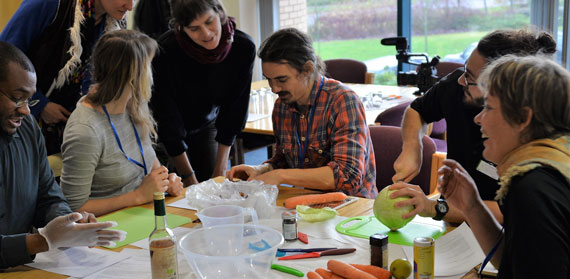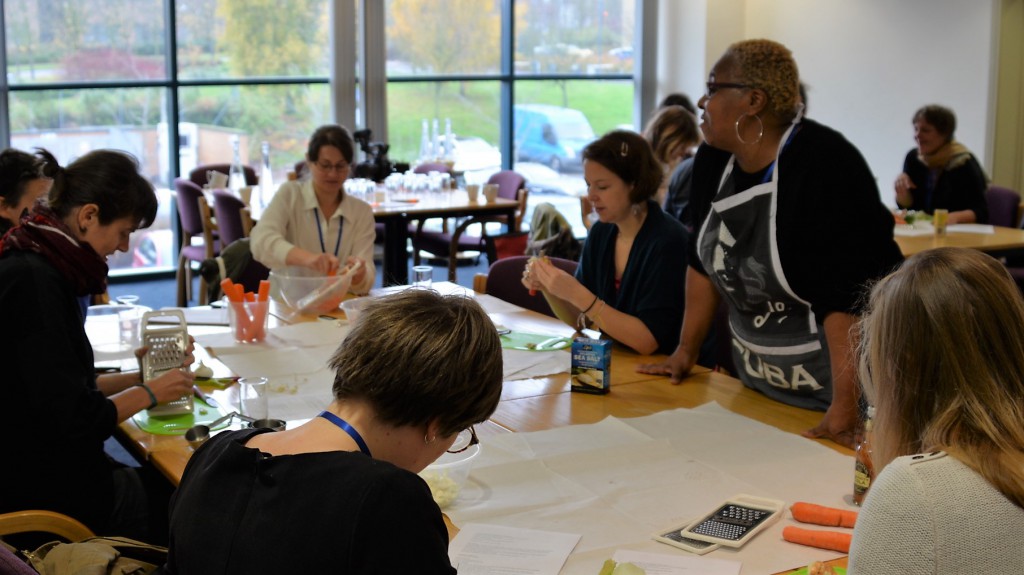Guest post by Lisa Ruetgers, Francesca Curran and Dee Woods, Centre for Agroecology, Water and Resilience
Re-imagining sustainable food planning and building resourcefulness: Notes from the 8th Annual AESOP Conference by Roscoe Blevins
On the 14th-15th November 2017, the Centre of Agroecology Water and Resilience (CAWR) hosted the 8th Annual Conference of the AESOP*. The two-day event, in the Coventry University’s TechnoCentre, attracted over 150 researchers, students and stake-holders from 20 countries. Attendees were treated to over 100 speakers across the 35+ sessions, three keynote speeches, nine books launches and a selection of folk songs about land rights and access to food!
The conference’s presentations, workshops and discussions were grouped into six main tracks:
- Agroecological Urbanism – exploring re-conceptualisation of urbanism in relation to food planning
- Political Processes – scrutinising political processes and strategies, including steering agri-food strategies, people-led policies, land-access and food-sovereignty movements
- Resourceful Land Management – exploring land access and rights, land and waste management, reshaping urban and rural links
- Agroecological Practices – examining agriculture, permaculture and agroforestry in urban spaces, organic indoor production, rooftop and vertical gardening and more
- Post-Capitalist Economics – including a whole selection of talks on food de-commodification and new [urban] food commons, to alternative currencies and community kitchens
- Alternative Methodologies – investigating the reflexivity of scholars and activists, de-colonisation and novel approaches to food planning through non-typical means
Each of these threads carried their own narratives and perspectives through the conference that were brought together in the three spectacular keynote speeches.
The keynotes began with Chiara Tornaghi (CAWR, and key conference organiser) and Michiel Dehaene (University of Ghent) delving straight into the field of urban agriculture with their joint presentation entitled “Food as an urban question, and the foundations of a reproductive, agroecological urbanism”.
Jahi Chapell (CAWR) gave an enlightening talk on his research into the institutionalisation of food sovereignty. He presented the case for institutions to support the “new three-legged stool” of agroecology, food sovereignty, and food justice, giving examples of the benefits and challenges this brings in Brazil.
The third keynote was delivered by Emily Mattheisen (FIAN International – an NGO working to protect and promote the human right to adequate food and nutrition), who examined the challenges and obstacles to achieving food sovereignty, and the development and effectiveness of different strategies being taken to get there.
While most of the sessions were a selection of short presentations followed by Q&A and discussion, some were even more interactive. Mama D took participants on a multi-sensory “Food Journey”, using taste, smell, sound and touch to retrace and explore our relationship with food over the last millennium and how this influences our current agri-food system. Dee Woods led a very hands-on workshop teaching participants how to make their own fermented preserves and stimulating discussion around the origins of food, cultural re-appropriation and food-sovereignty.
The evening event grew to include the launching of a total of nine publications by conference delegates:
- Everyday Experts: How People’s Knowledge Can Transform the Food System (People’s Knowledge Collective)
- Public Policies for Food Sovereignty: Social Movements and the State (Aurelie Desmarais, A, Claeys, P., Trauger, A.)
- Right to Food and Nutrition Watch 2017 The World Food Crisis: The Way Out 10th Anniversary Issue
- Beginning to End Hunger: Food and the Environment in Belo Horizonte, Brazil, and Beyond (Chappell, J.)
- Food Sovereignity, Agroecology and Biocultural Diversity (Pimbert, M.)
- Forest Gardening in Practice (Remiarz, T.)
- Gender, Nutrition, and the Human Right to Adequate Food: Toward an Inclusive Framework (Bellows, A., Valente, F., Lemke, S. and Maria Daniela Nunez Burbano de Lara)
- Political Ecology, Food Regimes, and Food Sovereignty: Crisis, Resistance, and Resilience (Tilzey, M.)
- Special Issue of RUAF Magazine UAM No. 33 “Urban Agroecology” (Produced by CAWR & RUAF)
In the true nature of the conference, the book launch was complemented by a dinner – grown by local farmers – and an interactive folk music performance by Robin Grey on the theme of land and food rights.
While the speakers did not shy away from the scrutinising the roots and scale of the issues surrounding food insecurity and the current vulnerability of our food system, the overarching feeling throughout the conference was one of optimism. The focus was on the exciting new technologies, strategies and movements that are shifting our agri-food culture toward sustainability and resilience. Achieving a sustainable, resilient and just food system is not going to be easy, though it is possible, and it will require innovative trans-disciplinary collaboration between researchers, policy makers and practitioners to get there. The innovative research presented at AESOP 2017 is a testament that this does, can and will work.
———————–
AESOP Conference 2017, Day 1
Delegates from all over the world travelled to Coventry to join the AESOP conference, creating a diverse and interesting research community. Researchers and practitioners openly shared their research interests and seemed to have been inspired by the sessions, creating lots of lively discussions during the day. Also the sessions were diverse and provided great experiences from an all-senses-journey through the history of food consumption to the presentation and discussion of various radical methodologies. The conference day ended with a book launch of inspiring work tackling issues such as the need for a more Marxist view on agriculture or the necessity to redefine knowledge and include unheard voices. Organisation and catering were great as well and it seemed that conference participants enjoyed the day, were inspired and made contacts for future collaboration.
———————–
On the 15th November, I volunteered at the 8th Annual Conference of the AESOP Sustainable Food Planning group, which was called ‘Re-imaging sustainable food planning, building resourcefulness: food movements, insurgent planning and heterodox economics’.
Currently, I am writing my undergraduate dissertation around ethnic minority access to food banks, so I found this event was a great opportunity for me to experience the atmosphere of and to participate in a conference.
Throughout the day I attended many different sessions and took photographs of the speakers. From an academic perspective I found this stimulating as I got a further insight into the work and research that ASEOP undertake. I particularly enjoyed sessions about food policies and strategies and agroecological urbanism, and the day broadened my horizons within this area. I noted all the hard work the CAWR colleagues put into the event during the time I was there.
A highlight of the day for me was observing and taking photos of Mama Ds session ‘The food journey’, which was an interactive session. The session was a multi-sensory experience which traced the story of food and allowed the participants to reflect on the concept of food. This session allowed the participants to have fun as well broadening their experience of food.
Towards the end of the day, I attended a talk by PhD students reporting on their training and learning. As an undergraduate student I felt that this allowed me to understand about post-graduate education and the what undertaking a higher degree entails a lot of hard work!





Comments are disabled